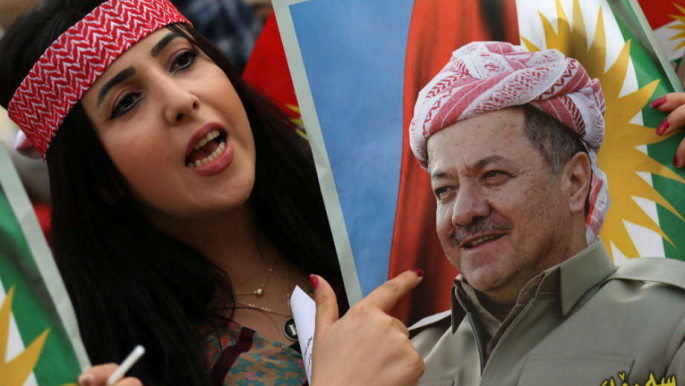Click here to receive The Iraq Report each week in your inbox
In a shocking turn of events, the president of the Kurdistan Regional Government, Masoud Barzani, has announced his intention to leave office on Sunday after 12 years as leader. It appears that, at least for now, the political career of one of Iraqi Kurdistan’s defining leaders is over, paving the way for a younger generation of Kurdish leadership prospects to take over.
Meanwhile, Iraqi Prime Minister Haider al-Abadi has seen his fortunes rise at the expense of his rivals in Baghdad. Abadi has overseen two significant victories in less than a year, first against the Islamic State group in Mosul and now against the KRG. His critics from within his own party are now on the back foot after having spent years attacking his credibility as a “strong leader”.
Masoud Barzani resigns
After 12 years as leader of the KRG, Masoud Barzani of the Kurdistan Democratic Party left office on 1 November. He will not seek for an extension to his presidency, nor will he contest the expected presidential elections that have been postponed once again.
In a closed session of the Kurdish parliament on Sunday, Barzani read out a letter announcing that he would resign the presidency effective from the start of November, and that the powers of his office would be divided between the prime minister’s office, as well as the judicial and legislative branches of government.
Barzani stopped short of declaring his full departure from Kurdish politics, and stated that he will remain active in the Peshmerga, the Kurdish military force that suffered a humiliating defeat at the hands of pro-Baghdad forces earlier this month across northern Iraq, including by losing the “Kurdish Jerusalem” of Kirkuk and other disputed territories.
Reactions to his resignation were mixed, with major powers welcoming the move while local supporters decried the resignation as a sign that Barzani, 71, was forced from office. US State Department spokeswoman Heather Nauert welcomed Barzani’s resignation and hailed him as “a historic figure and courageous leader of his people” who had shown “statesmanship” through his resignation.
However, these sentiments were not echoed by Peshmerga fighters loyal to Barzani and his KDP who stormed the Kurdish parliament in Erbil on Sunday, armed with clubs and automatic rifles to demonstrate their support for their leader. The Barzani loyalists alleged that Barzani had been betrayed by other Kurds – notably the rival Patriotic Union of Kurdistan party led by the Talabani family – and that the fiasco following the 25 September independence referendum was being used to force the elderly Kurdish leader from power.
Although Barzani’s bid for independence won overwhelming support from Kurdish voters, it was a calamitous miscalculation as it alienated the KRG from all its international backers – including neighbouring ally Turkey – and provoked a response from Baghdad that was heavily assisted by Iran. Everything that the Kurds had gained over the past three years were almost entirely reset, with Erbil itself threatened by Shia Islamist militants converging just 30 kilometres south of the Kurdish capital.
Barzani – who assumed the mantle of KDP leadership from his father Mustafa in 1979 – has throughout his career fought for and against various regional actors in his struggle for Kurdish independence.
During the 1980-88 Iran-Iraq War, Barzani accepted support from Tehran to wage a bloody insurgency against Iraq, which was then brutally crushed by the regime of former dictator Saddam Hussein in the Anfal Campaign near the conclusion of the war. However, he soon called upon Saddam for aid when the closely Iran-linked PUK almost defeated his KDP in 1996 during the Kurdish Civil War, and Barzani was rescued by his long-time foe.
 |
| Barzani remains a popular figure in Iraqi Kurdistan [AFP] |
Having courted western support and encouraged the US invasion in 2003 to topple the Iraqi government, Barzani established himself as a powerful actor in Iraqi politics, dominating Iraqi Kurdistan and positioning the KRG as an alternative oasis of stability in contrast to the violence of Baghdad. Barzani’s presidential term began in 2005, and was due to end in 2013 - but was “extended”, seemingly indefinitely, as the Kurdish leader set Iraqi Kurdistan on the road towards independence.
With his independence dream now definitively shattered, Barzani’s departure represents the second high-profile loss to Kurdish leadership in a month - his long-time rival and adversary, PUK leader Jalal Talabani, died on 3 October. This leaves both the KDP and PUK to be led by younger generations, likely of the Barzani and Talabani families.
Abadi ascendant as Baghdad gains power
While Barzani’s fortunes have taken a turn for the worse, Prime Minister Abadi has seen his star rise, with his critics and those who have sought to topple him from power retreating.
Abadi is now claiming credit not only for defeating IS in Mosul earlier this year and pushing the group back across vast swathes of the country, but also for bringing the KRG to heel after its independence referendum backfired spectacularly on the Kurdish leadership.
When he first became prime minister after the debacle suffered by the Iraqi army in the face of IS’ onslaught in 2014, Abadi was seen as a less divisive figure than his predecessor and fellow Dawa Party Shia Islamist politician, Nouri al-Maliki. While Maliki’s rampant sectarianism and persecution of Iraq’s Sunni Arab community was blamed for the rapid success of IS, Abadi was viewed by both Washington and Tehran as a more palatable face to the Iraqi government.
Despite being forced out of office, Maliki retained leadership of the Dawa Party and significant influence in parliament. Now vice-president, Maliki has used his positions of power to undermine Abadi, deeming him not only to be a threat to him politically, but also as a weak leader who could not defeat IS militants.
As the fight against IS progressed, however, Abadi has been at pains to point out that the collapse of five Iraqi divisions in 2014 was due to Maliki’s corruption and mismanagement. Abadi blew open the so-called “ghost soldiers” scandal in 2014, accusing Maliki of allowing corrupt officers to register up to 50,000 soldiers on active duty - even though they were either non-existent or never reported for duty. Corrupt officers would instead pocket these ghost soldiers’ monthly salaries.
Now that Abadi has overseen the dismemberment of the Iraqi side of the IS “caliphate” while simultaneously checking Kurdish independence ambitions, he is being seen as the most important man in Baghdad, with rivals like Maliki sidelined even further.
 |
| Despite the political turmoil, Erbil still knows how to party, with hundreds turning out to mark Halloween [Getty] |
Abadi’s victories built on foreign intervention
However, Abadi’s victories could not have happened without the support of the United States and Iran. Washington formed and led the international coalition that provided most of the air support needed by Iraq to be able to engage IS on the field of battle in the first place, while also providing extensive training to units later used against the Kurds, such as the elite Counter Terrorism Forces.
Meanwhile, Iran has deployed its Islamic Revolutionary Guard Corps and its enigmatic Quds Force commander Qassem Soleimani repeatedly throughout the conflict against IS. Soleimani helped organise the defence of Baghdad when IS were at its gates in 2014, and has continued to play a role by not only organising, funding and training the controversial Popular Mobilisation Forces, but also by intervening on Abadi’s behalf during the Kurdish independence crisis and convincing PUK Peshmerga fighters to withdraw without a fight.
Arguably, without support from both the United States and Iran, the Iraqi military would have been unable to prise cities from the grasp of IS, especially considering their tactical inferiority compared with the hardline group. Similarly, without Washington’s acquiescence and Tehran’s active support, Abadi would have struggled to prevent the Kurds from declaring independence.
In light of these inherent structural weaknesses in Baghdad’s halls of power, it is important to closely watch the interactions between Abadi and other powers in order to be able to gauge where the real influence lies. Currently, the scales are balanced in Iran’s favour over any other power, including the US. This is because Tehran influences not only Abadi, but the forces and institutions that maintain his power, including the Shia Islamist-dominated PMF, the interior ministry and other key centres of military and economic power.
Considering Iran’s influence winds deep into the Iraqi state and is being contested by actors including Washington and, increasingly, Saudi Arabia, it remains to be seen just how independent Abadi can remain - or if he can successfully play the competing parties against one another.
Click here to receive The Iraq Report each week in your inbox
Follow us on Twitter: @The_NewArab





 Follow the Middle East's top stories in English at The New Arab on Google News
Follow the Middle East's top stories in English at The New Arab on Google News


